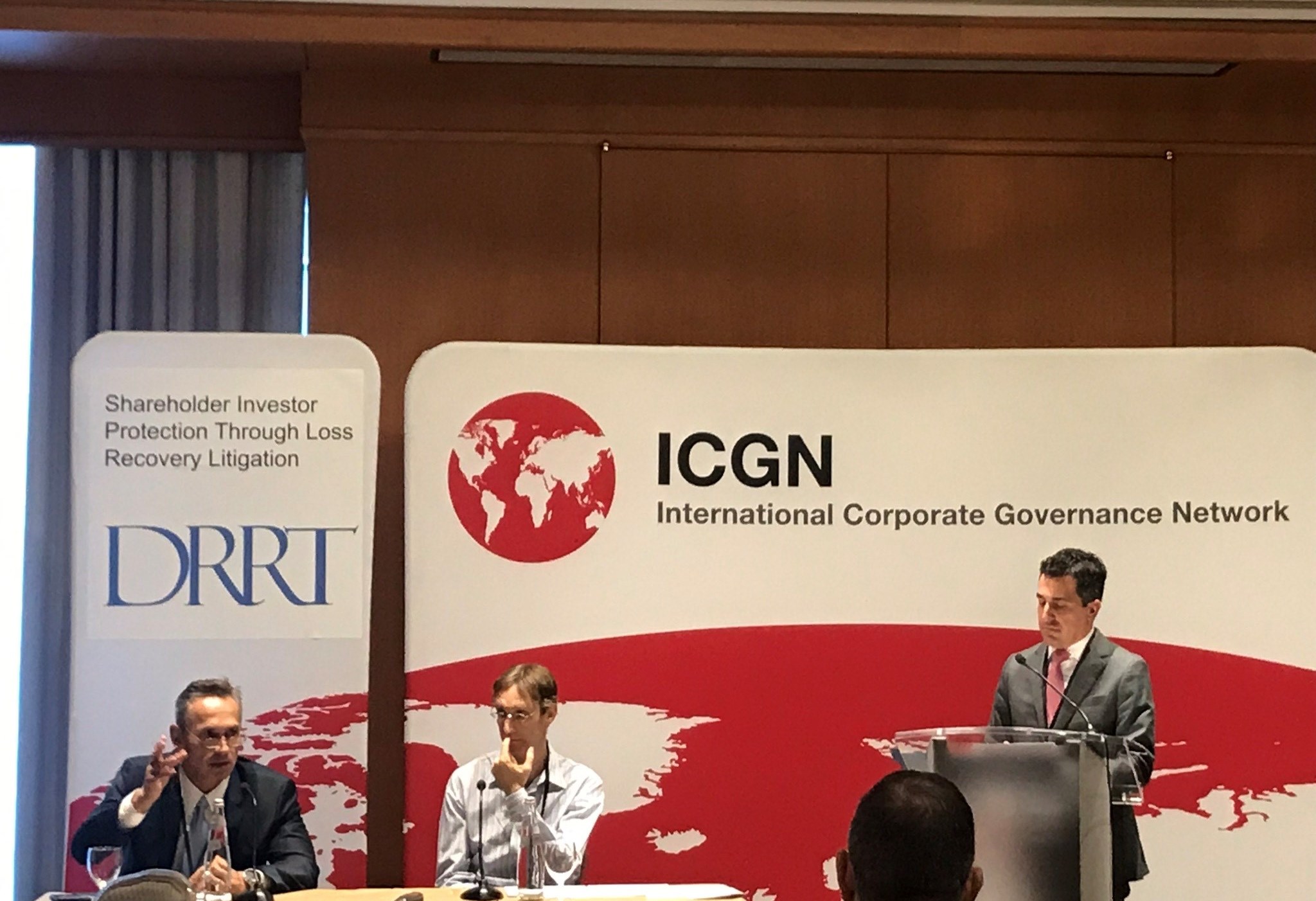DRRT is committed in supporting our local community in the challenging times surrounding the COVID-19 pandemic. DRRT is proud to support the efforts of the Lotus House in providing shelter for women, youth, and children. DRRT’s donations served to stock up on supplies, additional staff, and an increased number of meals served as the shelter in place order was issued.
DRRT will continue to support our local community and we thank our clients who make this possible.
Read More
Topics:
corporate social responsibility,
COVID-19,
Support,
Community
DRRT’s Assistant Managing Partner, Joseph Gulino had the pleasure of speaking at the Sovereign Wealth Fund Institute’s 2020 Institute Fund Summit in Austin, TX. The panel, “Corporate Governance and Shareholder Engagement” discussed some of the corporate governance measures that institutional investors have at their disposal as well as the importance of litigation as a means of shareholder engagement.
Read More
Topics:
Class Action,
shareholders,
swfi,
stewardship,
corporategovernance,
ESG,
compliance,
litigation funding
As 2019 comes to an end, we are looking forward to the New Year with legal developments in the securities litigation world. As part of our ongoing commitment to be the leaders in covering global developments of interest for our institutional clients, we would like to highlight the new Dutch Act on Collective Damages Claims (Wet Afwikkeling Massaschade in Collectieve Actie; short: WAMCA). The WAMCA will finally enter into force on January 1, 2020 and complement the preexisting act on collective settlements of mass claims (WCAM). The WAMCA will cover collective damages actions for claims resulting from conduct that took place after November 15, 2016, the date that the legislative proposal was submitted to the Dutch Parliament. After various amendments, the WAMCA was finally approved in March 2019.
Read More
Topics:
law,
shareholders,
newsletter,
WAMCA,
investors,
netherlands,
dutch
DRRT successfully hosted the panel regarding Shareholder Protection through Loss Recovery Litigation at the International Corporate Governance Network Miami on October 16, 2019.
Read More
Topics:
litigation,
shareholders,
shareholder protection,
conference,
ICGN,
loss recovery
DRRT’s Managing Partner, Alexander Reus, was invited to speak at the 17th Brazilian Congress of International Law and at The Center for Arbitration and Mediation of the Chamber of Commerce Brazil-Canada for presentations regarding investor protection in Brazil and around the world. He participated, along with Mr. Claudio Finkelstein and others, on a panel named “Shareholder Loss recovery: Arbitration vs. Litigation? Quo vadis?”.
Read More
Topics:
Arbitration,
Brazil,
law,
shareholders
On Thursday, June 20, 2019, DRRT, along with its local counsel Koga & Partners, successfully filed the first complaint against Kobe Steel, Ltd in Tokyo District Court, claiming over ¥5 billion in damages. Kobe Steel is Japan’s third largest steelmaker, as well as a major supplier of aluminum, copper and other products around the world.
Read More
Topics:
Global Loss Recovery,
Kobe,
litigation,
complaint,
steel,
japan
On Wednesday, April 3, the Italian parliament passed a long-awaited class action law with broad application. The road to the creation of this law has taken many years, and it will not be fully in force until next year. While this is a welcome development for institutional investors in publicly traded companies, it could be significant amount of time before we see any real case develop, particularly relating to securities claims, as the law only apply to events taking place after the entry in force.
Read More
Topics:
Class Action,
Italy
The most important statutes in US securities cases are the Securities Act of 1933 (the ’33 Act) and the Securities Exchange Act of 1934 (the ’34 Act). Whereas the ’33 Act regulates issuers making an initial public offering (IPO), the ’34 Act regulates the secondary market. Thus, largely due to trade volume and investor exposure, the ’34 Act in many respects has much greater reach than the ’33 Act.
Read More
Topics:
U.S. Securities Class Actions,
Class Action
As we have just entered 2019, we here at DRRT would like to provide a quick overview of the trends we noticed in our work as a claims filing provider during 2018. This year had major developments, and we are still waiting to see how this will play out in terms of recoveries for many of the cases. However, the increase in Australian actions, the complexities of the antitrust settlements such as FX and LIBOR, and the evolution of new jurisdictions prove that having a robust claims filing provider, with an extensive legal background, can make a major difference in terms of maximizing recoveries and ensuring all opportunities are explored.
Read More
Topics:
Global Loss Recovery,
U.S. Securities Class Actions,
Claims Filing,
Settlements,
LIBOR,
australia,
Antitrust,
FX
Redress - Generally
In modern legal proceedings, different countries and jurisdictions have all had to confront a need to administer a large volume of cases that can arise out of a common set of facts. Often these cases involve relatively few defendants with many thousands of plaintiffs. In the context of investor recovery proceedings, a common circumstance is that a business entity and its directors are accused of wrongdoing (the defendants). Often the defendants’ conduct is alleged to have caused recoverable harm against many injured investors (the plaintiffs). The many investor-plaintiffs largely all share the same injury caused by the related conduct of the same relatively few defendants. In resolving this and similar situations, countries have developed a number of approaches.
Read More
Topics:
Settlement,
U.S. Securities Class Actions,
Arbitration,
Class Action









